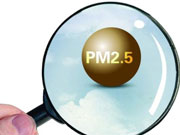China central gov't sets new goal for PM2.5 levels

 0 Comment(s)
0 Comment(s) Print
Print E-mail CNTV, August 30, 2013
E-mail CNTV, August 30, 2013
The State Council is about to release a new plan to combat air pollution, with goals of reducing PM2.5 levels by 25 percent by 2017. This is welcomed news for northern China's Hebei province, which is struggling to contain dense smog that often engulfs the region.
This region has the worst air quality in all of China.
Containing air pollution is the local government's main task.
Yu Hua Thermal Power Plant, in the provincial capital Shijiazhuang is installing special equipment, to filter the emissions that are released. Its two-power unit used to discharge nearly ten thousand tons of the common pollutant oxynitride every year.
Wang Xiaoyi, engineer with Yu Hua Thermal Power Plant, said, "The designed efficiency of our equipment is 80%, we could reduce oxynitride emission by eight thousand tons."
However, the new equipment will cost 140 million yuan, but the plant's profits are only 50 million a year. The pressure put on the provincial government is leaving them with no choice.
Wang said, "We plan to finish the installation by 2015. The estimated investment will be 330 million yuan."
In the mean time, over 600 coal-fired boilers have been dismantled in Shijiazhuang.
Yin Guangping, deputy director of Hebei Environment al Protection Office, said, "We need alternative energy sources to replace coal. That could be natural gas. But the natural gas supply mainly relies on imports."
In order to monitor air pollution, the province's environmental protection office has turned to advanced satellite technology.
Zhang Peng, deputy chief of deputy director of Hebei Environment al Protection Office, said, "We can find the basic patterns of air pollution using satellite remote censoring. That enables us to know how vast and severe it is."
The next step is to expand the monitoring area to counties in order to cover the entire region.
Chen Guoing, director of deputy director of Hebei Environment al Protection Office, said, "The goal to reduce PM2.5 levels has put pressure on local governments. We're planning to publish the worst ten or twenty regions by next year."
Reporter: "Fighting air pollution is difficult because it involves a lot of energy, and the cooperation of manufacturing and transportation sectors. It will also inevitably affect the economic development of certain areas in the country. In the end, the battle to curb pollution will be a battle waged by the central government to make sure local governments enforce its environmental measures."






Go to Forum >>0 Comment(s)